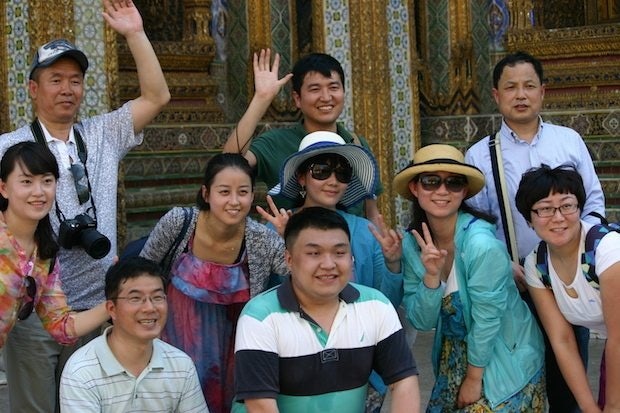
Chinese tourists at the Grand Palace in Bangkok, Thailand. (Jing Daily)
This article was published earlier in our weekly newsletter. Sign up through our “Newsletter Sign Up” box on the right.
With outbound Chinese tourists now the world’s biggest-spending travelers, luxury retailers and hoteliers constantly remain on the lookout for the next big Chinese travel hotspots. To date, this has meant keeping a close eye mainly on Asia, which currently accounts for almost 90 percent of Chinese tourist arrivals. Tracking the top growth destinations is a difficult task, however, thanks to delicate political situations in the region that cloud the outlook, leaving brands to ask which areas that are popular with Chinese tourists will remain so in the long term.
A particularly timely example of this is Sri Lanka, which saw Chinese tourist arrivals increase by 136 percent in 2014, during the administration of markedly “pro-China” president Mahinda Rajapaksa. However, things have changed with Rajapaksa's defeat at the polls this January to Maithripala Sirisena, who has been far more critical of major tourism and luxury development projects undertaken by Chinese companies—many of which have since been put on hold. Under Sirisena's leadership, less chummy ties between China and Sri Lanka have raised questions about the sustainability of Chinese tourist arrival growth. At the moment, the picture remains relatively rosy, with Sri Lanka sticking to its projection of 2.5 million Chinese visitors by 2016 and hoteliers like Shangri-La continuing their expansion in the country.
This is not to say that Chinese tourists are completely ambivalent about politics when choosing tourism destinations. This was made crystal clear during China’s 2012 anti-Japan boycotts over the Senkaku Islands controversy, which caused Chinese visitor numbers to plummet. While Chinese travel to Japan has surged over the past year, providing a much-needed boost to the Japanese luxury market, the fact remains that Chinese tourist interest in Japan remains dependent on the relations between the two Asian giants. Most recently indicating how Chinese tourism is tied to politics, anger over the treatment of families of Chinese passengers on Malaysia Airlines flight MH370 caused mass boycotts of travel to Malaysia in China.
Yet it's not just abstract political issues that keep Chinese visitors away—they’re also especially sensitive to safety issues caused by political strife. Examples of this include anti-mainland sentiment like Vietnam’s anti-China riots in May 2014 and Hong Kong’s anti-mainland demonstrations, which have continued since February. In recent months, anti-Chinese violence in Mongolia has angered Chinese netizens. Potential travelers have also driven away by shaky political situations that don't directly involve them. Thailand’s 2014 demonstrations and coup caused a significant drop in Chinese tourist numbers.
Political considerations also affect the ease in which Chinese travelers can obtain visas. India and China’s traditionally cool relations have been attended by a cumbersome visa application process, and as a result, India has seen only a trickle of Chinese visitors despite the fact that the two countries share a sizable border. However, this may be set to change, as India and China work on improving relations and India continues a marketing push to attract more Chinese visitors.
This complicated and shifting landscape can pose headaches for luxury brands, retailers, and hotels deliberating locations in Asia that will lead to stable growth. Like China’s own fluctuating domestic market, it’s important for brands to look at the long-term potential for important destinations by evaluating the situation on-the-ground as well as historical and current sentiment in China. Are there any simmering political issues that could boil over at any time, as in the case of Southeast Asian countries with long-standing territorial issues with China, among them Vietnam and the Philippines? Any threat that anger towards ethnic Chinese could boil over, as in the case of Indonesia or Malaysia? Brands need to investigate which locations are perceived as safe by Chinese tourists, as well as the risk for political issues to arise, then conclude whether any potential flareups could cause a drop in Chinese interest and arrivals.